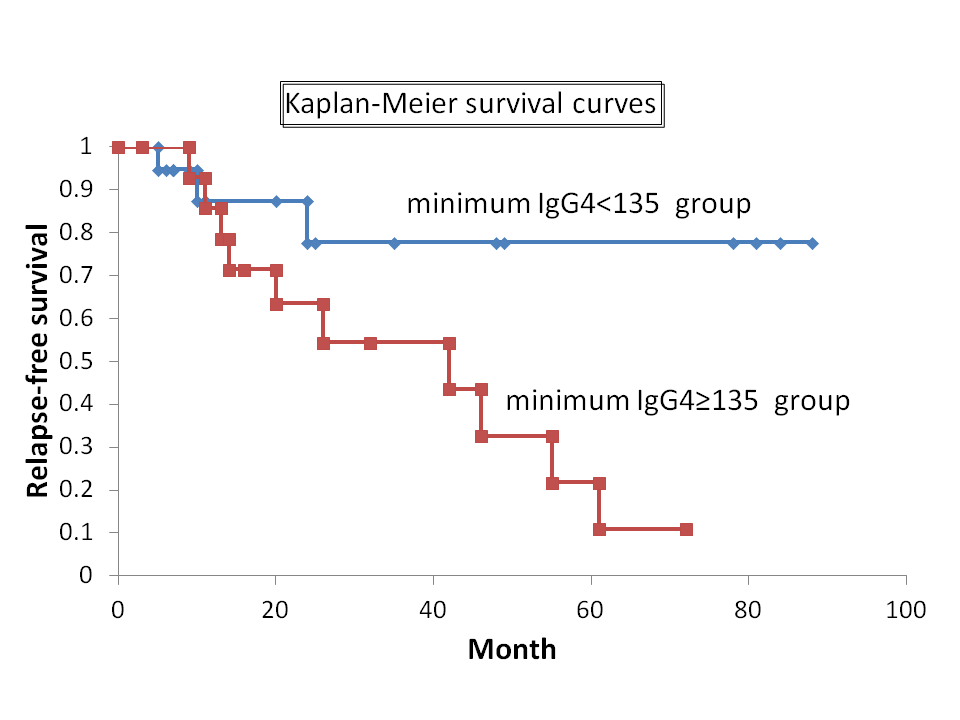Session Information
Date: Monday, November 9, 2015
Title: Miscellaneous Rheumatic and Inflammatory Diseases Poster Session II
Session Type: ACR Poster Session B
Session Time: 9:00AM-11:00AM
Background/Purpose:
IgG4-related
disease (IgG4-RD) is a recently recognized systemic fibro-inflammatory disease
of unknown etiology with multi-organ involvement. Although the organ involvement
in IgG4-RD usually improve with initial glucocorticoids (GC) therapy, relapse
occurs frequently during GC tapering. This study was aimed to elucidate the
factors influencing the relapse of IgG4-RD during GC therapy.
Methods:
Thirty-five IgG4-RD patients were enrolled. They all met Comprehensive
Diagnostic Criteria for the diagnosis of IgG4-RD and were treated with GC in
Kobe university hospital or Shinko hospital, Kobe, Japan. “Relapse” was defined
as recurrence or new appearance of organ involvement attributable to IgG4-RD
which required increase in immunosuppressive therapy. Association of various
clinical parameters and relapse was determined by Students’ t-test or Welch’s
t-test. Relapse-free survival was compared by the Kaplan-Meier estimation.
Results:
Ten female and 25 male patients were retrospectively analyzed. The mean age at
the time of diagnosis was 63.9±10.2 years (range 45-81). All 35 patients were
treated with GC, and 14 patients relapsed (40%). The mean duration from the
initiation of GC therapy to relapse was 27.0±18.7 weeks. The baseline serum
IgG4 levels before GC therapy was significantly higher in patients with relapse
than in those without (P=0.017; median 843 to 426 mg/dl). Minimum serum
IgG4 levels during GC therapy also tended to be higher in patients with relapse
than that in patients without (P=0.055; median 185 to 102 mg/dl). In
contrast, sex, age at the diagnosis, numbers of involved organs, initial GC
dose, and GC dose in maintenance therapy were not different between patients
with and without relapses. ROC curve analysis on baseline serum IgG4 level
revealed that the best cut-off level which maximized sensitivity and
specificity for the prediction of relapse was 532mg/dl. The patients with
baseline serum IgG4 level less than 532 mg/dl (“baseline IgG4<532 group”)
showed better relapse-free survival than “baseline IgG4
test, (X2
= 5.94, P=0.015))
(Figure 1). In addition, when patients were divided into two groups according
to whether their IgG4 levels declined below 135 mg/dl (“minimum IgG4<135
group”) or not (“minimum IgG4
relapse-free survival (Log-rank test, (X2
= 4.85, P=0.027))
(Figure 2).
Conclusion:
Higher serum IgG4 concentration before and during GC therapy are risk factors
for predicting relapse in IgG4-RD. Serum IgG4 levels should be monitored during
the therapy.
Figure 1
Figure 2
To cite this abstract in AMA style:
Sendo S, Saegusa J, Onishi A, Naka I, Tsuda K, Okano T, Akashi K, Takahashi S, Nishida M, Nishimura K, Ueda Y, Kogata Y, Kageyama G, Tsuji G, Kumagai S, Morinobu A. High Serum IgG4 Concentration Is a Risk Factor for Relapse in IgG4-Related Disease [abstract]. Arthritis Rheumatol. 2015; 67 (suppl 10). https://acrabstracts.org/abstract/high-serum-igg4-concentration-is-a-risk-factor-for-relapse-in-igg4-related-disease/. Accessed .« Back to 2015 ACR/ARHP Annual Meeting
ACR Meeting Abstracts - https://acrabstracts.org/abstract/high-serum-igg4-concentration-is-a-risk-factor-for-relapse-in-igg4-related-disease/


